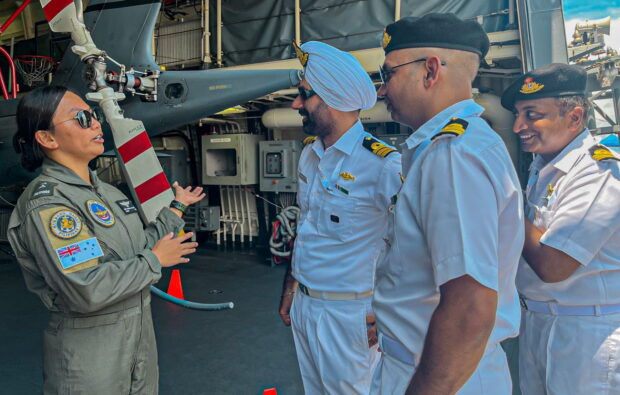
BOAT TOUR Members of the Indian Navy visit the BRP Antonio Luna at Changi Naval Base in Singapore on May 4. A task group of the Philippine Navy was there to take part in the first Asean-India Maritime Exercise, its “sea phase” conducted in the South China Sea on Sunday until today. —PHOTO FROM PHILIPPINE NAVY
India is aiming to become a key player in the Philippines’ military capability upgrade as it seeks to promote itself as a major arms exporter in the region.
The Indian Embassy in the Philippines flew in a business delegation to Manila last week to showcase its domestically made defense platforms and explore potential defense industry partnerships as part of the inaugural India-Philippines defense industry seminar.
Among the more than 20 Indian defense companies present were representatives from the Hindustan Aeronautics Ltd., DCM Shriram Industries Ltd., Bharat Dynamics Ltd., Mahindra Emirates Vehicle Armouring and MKU Ltd.
President Marcos recently approved a P2-trillion revised military modernization plan called Re-Horizon 3 that would be implemented over the next 10 years.
“We have naval systems, we have fighter aircraft. We have a broad range of capabilities on the Indian side—helicopters, attack helicopters, land systems, artillery systems—and some of those would match with the capabilities you are looking to acquire in the Horizon 3,” Indian Ambassador Shambhu Kumaran said on the sidelines of the defense industry seminar in Taguig City last Friday.
The Philippines is the first foreign customer of India-made BrahMos supersonic cruise missiles under an P18.9-billion deal signed in 2022. The first batch of the missiles is expected to be delivered “soon,” Kumaran said, but he declined to give a timeline.
Defense self-reliance
Manila has yet to tap the $100-million credit line earlier offered by New Delhi to support its defense needs.
“Our offer is very much on the table. We have announced our intent to offer a soft loan for defense procurements and this could also cover activities that would eventually extend some sort of joint industrial activity,” Kumaran said.
“My understanding is that the Philippine side is currently in the process of trying to put in place a framework in which they want to develop this entire self-defense posture program so we’ll just wait to see when it comes through from the Philippines,” he added.
Selling proposition
Kumaran said India could also assist in the Philippines’ efforts to build a self-reliant defense posture. The Department of National Defense has been pushing for a posture that prefers local suppliers to promote limited dependence on foreign support for its defense requirements.
“We recognize that countries such as the Philippines, which have broad national security interests, will need to have some domestic industrial capacity and we’d like to offer partnerships from India in building that capacity. So I think looking to the future, not immediately, this is a very important initiative,” Kumaran said.
READ: PH to get supersonic missiles soon – India envoy
“India has a proven track record of trying to create indigenous capability, to develop indigenous technology and to broad base that into broader industrial capacities. So we are willing to offer our experience and our companies are willing to partner with relevant Philippine entities to do this in a meaningful manner,” he noted.
Kumaran cited India’s affordability as its advantage among other foreign arms exporters.
“India’s unique selling proposition is that we are able to bring cutting edge technology at competitive prices…. If you’re looking at a realistic option, then I would suggest that India is a very good option,” he pointed out.
“We are both peaceful nations. We do not crave other people’s territory, other people’s waters, but we will not see efforts that try to limit our access to our territory and our resources either. So we have to go beyond the talk,” he added. INQ

